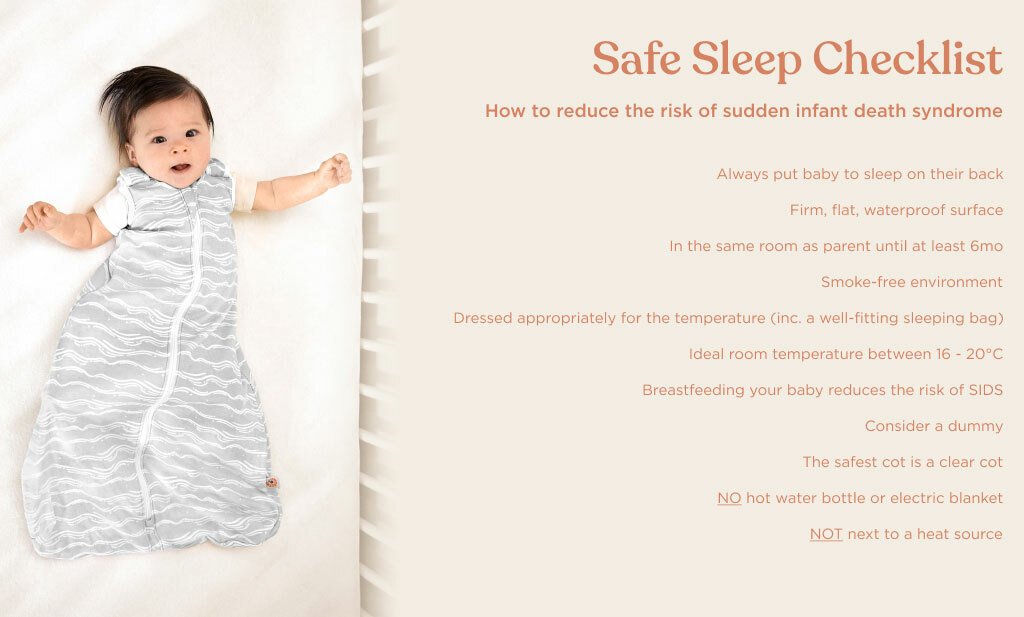
It’s a science in itself: baby sleep. It can be a rough ride for many parents because although baby is tired, it seems they won’t sleep. But, do they not want to sleep, or are they simply unable find their own way to sleep? After all, they are bombarded with a lot of new information every day, every hour, every second, for such a little creature. It keeps their body and mind very busy, and it can be hard for them to ‘switch off’. But lucky for them, they have you. Because with your help, they can get the sleep they need. The basic ingredients for this are: relaxation, a strong sense of security, and routines. Nothing beats routines and rituals to help your baby fall asleep. Because they convey security and security relaxes them.
A few months ago, we shared tips on how you can help your little miracle (and ultimately you too, of course) get a better and healthier night’s sleep. Age-appropriate bedtime and evening rituals included. Today we would like to add to this list of tips with the help of our sleep expert and midwife Katrin Ritter. Because Katrin knows what babies need and what can help you as parents when it comes to baby sleep.
Baby won’t sleep – our 10 top tips
- The right (co-sleeper) bed right from the start
Your baby is growing. And at a rapid pace. Which can mean you end up buying multiple different beds for the first five years of your baby’s life. This is hard on the wallet and means that your little one must get used to a new sleeping environment over and over again. Therefore, we recommend simply buying a bed from the start that will fit for the next five to ten years. Including a firm and stable child-appropriate mattress, of course. As we have often mentioned, a family bed makes perfect sense in the early years. It’s a simple way of helping your little one to sleep and makes them feel safe and secure. A win-win situation for everyone involved. If you have enough space in your bedroom, you can simply get a normal single bed with appropriate mattress and attach it to your bed at the same height. Make sure there are no gaps or places baby can get stuck or fall from. If there is not enough space in the bedroom, a cot or toddler bed that can be left open on one side is also suitable. These are usually narrower and only 120-140 cm long. Later, when your little one moves out into the nursery, you can simply move this bed into the nursery. - The safe sleeping environment
We have often explained here what a safe sleeping environment looks like. You can see our guide below, if it helps then you can download and print out these recommendations and hang them on the fridge or in your bedroom.
- The right baby sleeping bag
Your baby tosses and turns in their sleep. Whilst adults/older children can pull the blanket back up to their chin in their sleep, your baby is not yet able to do this. That’s why a suitable baby sleeping bag of the right thickness is ideal so that your baby can sleep safely and sufficiently warm and cosy. And it’s important that it fits correctly too so that baby won’t slip into it. So please don’t buy one that your baby will have to grow into unless it is adjustable. The guideline is: body length of the child minus the length of the head plus 10 to 15 centimetres for movement and growth. Our Ergobaby sleeping bags are therefore available in different sizes, but also in different thicknesses. To ensure that your baby feels comfortable, we recommend a different thickness and a matching choice of clothing depending on the room temperature in the bedroom. You can find out what you should wear for your little one in summer or winter, depending on the thickness of the sleeping bag, in our TOG table. - The darkened bedroom
Day or night? A newborn baby doesn’t know the difference between day and night and still needs to learn this rhythm. You can help them with this by darkening the room for each nap where possible. It is much easier to calm down in a darkened bedroom without any stimuli. - Co-regulation is key
Your baby doesn’t want to sleep? As parents, you are the co-regulators for your child. This means that you set the direction and respond to your child’s needs: if they are hungry, you give them something to eat, if they are tired, you accompany them to sleep, and so on. It’s as simple as that. - A dummy after a successful breast/chestfeeding start
Yes, you read that right. Our expert Katrin recommends a dummy. This is because it satisfies your newborn’s need to suck and can therefore contribute to self-regulation. You can therefore offer them a dummy for sleep. But only when breast/chestfeeding is fully established, usually around 1 month old, and stop giving them the dummy when they’re between 6 and 12 months old. Caution! The dummy piece between the lips should be very flat so that the mouth can still close properly. It is also advisable to choose an age-appropriate size. - The baby comforter (from the 5th month)
When can you give little one a baby comforter as a sleep aid? From the age of about five months. A cuddly toy, muslin toy or doll can be very helpful when falling asleep, as it takes on your child’s scent and calms them down. It also teaches your baby later that this little friend and helper is always there to soothe them. However, it should not be too big and should be made of suitable organic material. In addition, your baby must not be left alone with it while they sleep. As soon as they have fallen asleep (in your presence!), take the comforter away for next time. From around 12 months, you can leave it with them, and they can then look for their little friend in bed and soothe themselves. Until that age, remember that the safest cot is a clear cot.
- Another bedtime companion other than mum
It’s not just mum who can help your child fall asleep, another close caregiver/s can too. Introduce dad or grandparents or another trusted caregiver as bedtime companions when you are comfortable doing so. If you are breast/chestfeeding, it may help for you to pump a little milk from time to time so this can be offered to baby in your absence. - Age-appropriate wake and sleep times
You may have already heard that there are age-appropriate wake and sleep times that you should try and adhere to. You can find sleep charts on our blog that you can use as a guide. But every child is different. Find out what your baby really needs and adapt the times to their age. This basically means: at the first sign of tiredness, take all the necessary measures immediately. Don’t overtax your baby, as this can quickly cause them to get upset. Crying is the last thing your baby will do to let you know that they are tired. So try not to let it get that far in the first place. It is also important to get up at the same time in the morning and evening with a tolerance of around 30 minutes. This gives your baby structure and therefore security which enables relaxation. - Continued sleep support – for as long as necessary
Your baby won’t sleep through the night straight away. They can’t. This is because sleep consists of successive sleep cycles, each lasting 45 to 60 minutes. And at the end of each cycle, your baby usually wakes up and often needs your help to get back to sleep. This will improve over time and your little one will learn to link the cycles together independently. But until then, they need you. However, this doesn’t necessarily mean that you must feed, pick up or nappy change them every time – unless you want to. As soon as your baby is drinking well, gaining weight and is a little older, you can try increasing the intervals between meals during the night (please discuss this with your midwife or doctor). If your baby wakes up, you can try talking to them quietly, humming, repositioning them and putting your hand on them. This may be enough to let them know that they are safe and can go back to sleep.
Your baby won’t sleep – these 10 tips will help!
One of the hardest things to deal with as parents is sleep deprivation! But the good news is, if it seems like your baby won’t sleep then these tips should help. If you follow these recommendations, you will create an important base for good sleep hygiene for all the family.



